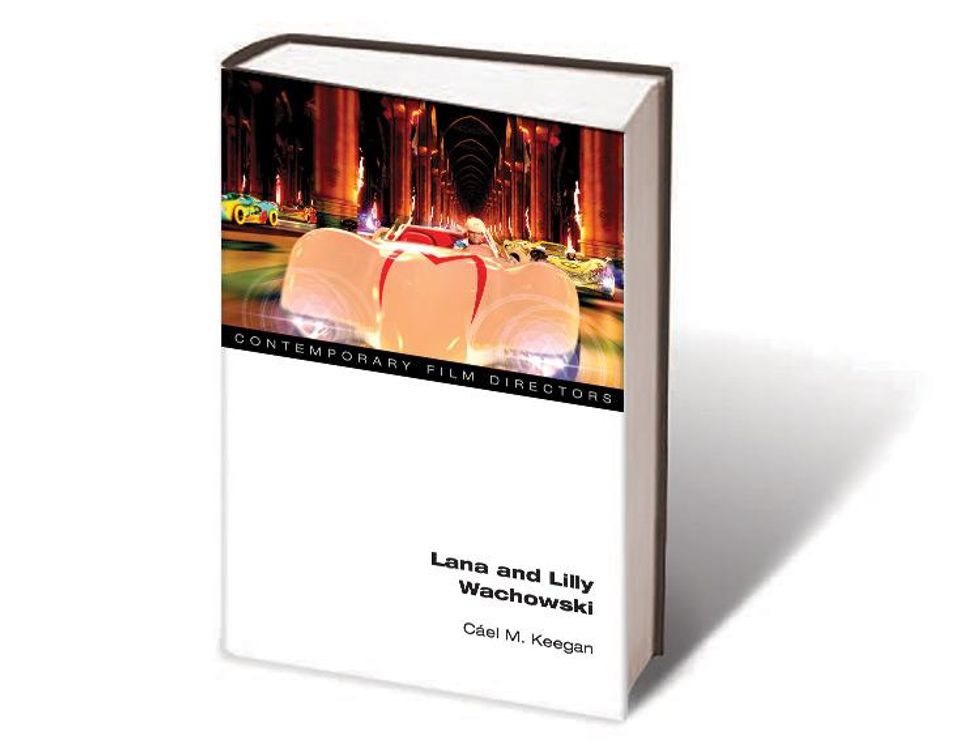When Bound hit movie theaters in 1996, the neo-noir lesbian crime thriller instantly became an underground classic among queer women, especially femmes. It was the first of its kind to show a romance between two smart women (played expertly by Jennifer Tilly and Gina Gershon) where their queerness was explicitly wrapped up with their butch-femme gender identities. The filmmakers brought on sexpert Susie Bright to help orchestrate the lesbian sex scenes, and a slew of local San Francisco Bay Area lesbian and bi women turned out as background players to help the bonafides. But it still confounded some that Bound, directed by the Wachowski siblings --whom everyone at the time considered two straight cis guys -- felt authentically lesbian. Today of course, Lily and Lana Wachowski, who both came out as trans in the 2010s and one who is married to a women, can easily be called the most powerful transgender (and queer?) filmmakers in the U.S. Their oeuvre, which includes a slew of film and TV projects that changed entertainment (including The Matrix, V for Vendetta, and Sense8), is finally getting a second look by Cael M. Keegan, a professor of women, gender, and sexuality studies and liberal studies at Michigan's Grand Valley State University. Just days before Lana Wachowski announced their new offices were for sale and hinted at a retirement for the Wachowski siblings, we asked Keegan about his new book, Lana and Lilly Wachowski: Sensing Transgender (Illinois).
The Advocate: There was a glitch at Target where the word "transgender" was censored on your cover.
Cael M. Keegan: I never expected my book to be covered in The Washington Post as an example of internet censorship! What was so ironic is that Target's effort to produce a "safe" online shopping environment scrubbed words as innocuous as "transgender" from its site. It really got me thinking a lot about the layers of erasure that make trans art or even writing about that art difficult to produce and access.
Was that a surprise?
As a transgender creator, you sense these forces all around you, but it's still a bit of a shock when they happen so overtly. You're like, Really? Still this? There was a kind of poetic occurrence to the whole issue given that so much of the Wachowskis' cinema is about the condition of invisibility. To see them described on Target's website as "the world's most influential ****** media producers" recreated the problem of transgender erasure my book attempts to address.
I've long called Bound one of the most important lesbian films for its depiction of lesbian sexuality and the recognition of femme as a gender identity. At the time, I was wrote of my surprise that the Wachowski "brothers" made a noir film with a female gaze.
Yes, absolutely. I write in the book about this response to Bound, which surprised critics at the time with its queer integrity because it seemed to be directed by cisgender men. Of course, the lesbian and bi women who consulted on set were crucial to Bound's cultural accuracy -- this has long been recognized, especially by the Wachowskis themselves. However, I do think there is something about Bound's attention to the limitations of perception and the function of passing that is simultaneously resonant with a specifically trans sensibility. One thing I suggest is that the butch-femme erotic in lesbian culture is itself bound up with and inseparable from trans modes of desire.
Are you the first to revisit Bound after Lana and Lilly came out as trans?
I believe I am. I argue for Bound as perhaps the finest example of 20th century queer cinema. It was not sufficiently incorporated into New Queer Cinema histories due largely to its presumed authorship by "men."
Which Wachowski films do you most think require us to reframe our interpretation now?
I do think we need to have a new conversation about The Matrix series, because those films were so crucial to the evolution of both action cinema and modern science fiction. There has been so much written and said...it can be difficult to feel like you have any chance at shifting the terms of the discussion. And of course, there is the whole use of the film by the right wing, which has produced new difficulties for reframing The Matrix's role as perhaps the most influential piece of trans-produced media in human history. We're about to hit the film's 20th anniversary in 2019. I'm hoping that my book and the conversations emerging around the Wachowskis as trans creators might offer some new opportunities to revisit The Matrix at 20 -- as a film that has so much to say about identity, embodiment, and reality, and how these are still very central concerns in popular science fiction cinema.
Favorite Wachowski film? Most confounding?
My favorite Wachowski film is actually Bound. There has always been something about Bound that electrifies me. When I revisited it for the book, I was astounded all over again by Jennifer Tilly's performance as Violet. I truly believe it is one of the most compelling performances of queerness or transness ever given on screen. There is a thesis offered by Violet in Bound that I think drives the entire body of the Wachowskis' work: "You can't believe what you see, but you can believe what you feel." It's a line that captures the most deeply shared experiences of queer and trans people -- the ways in which the culture renders us as unreal, and the need to develop faith in our own sensations.
Bound is perhaps also the most confounding Wachowski film for me, because there is a mystery or opacity to it that I haven't been able to explain. There is something about Violet that remains ineffable and unrepresentable and I love that -- how she escapes signification. Violet for me is an example of how transformative it can be to refuse to be identified as one thing or another.
You visited the Wachowski set after the Pulse massacre.
Immediately after Pulse, I felt rage. When your life feels like war, sometimes a response that looks like war is what you get attached to, that reactivity and repetition. I didn't immediately understand Sense8 as a creative response to the deeper constructs that drive violence -- until I saw how Lana and [director] James [McTeigue] worked together with the cast and crew, the sheer effort to make something that could aesthetically transform the conditions of our culture. It took me some time to realize that this is what the Wachowskis have really always been doing with their art, teaching us through images and sound how to sense differently.

In what ways have the Wachowskis changed cinema, and can that progress be called "trans" itself?
The Wachowskis have certainly made historic breakthroughs in queer and transgender representation, but what I try to demonstrate in the book is how their work is trans at the level of aesthetic practice.... They have always been interested in pressing beyond the limitations of cinema's formal aspects and conventions. While they've given us some incredibly valuable queer and trans characters, they've also made transformative contributions to how cinema actually works and looks -- especially in terms of genre and in how the body moves through time and space. The Wachowskis have approached cinema as if it were like gender, applying a transitional consciousness to the medium itself.
Are there other films that deserve another look based on the filmmaker's "changed" gender identity?
I don't think the Wachowskis necessarily changed their gender identities, as much as they invited us to realize a previously unperceived reality about them, which is what their cinema is also always doing for audiences. Because people's internal sensations are not obvious, we need to constantly revisit the measures by which we classify things as either "transgender" or "queer." This is what makes talking and writing about trans* culture and lives so complicated. I'm interested in how trans* aesthetics are all around us, alive at the center of our culture -- and in exploring what effects they have had on our collective perceptions.
Why do you use trans with an asterisk?
I use trans* to unsettle the assumption that gender is historically fixed and determinative. So much of [the Wachowskis'] art resists simple or singular identity positions. So, rather than claiming to discover a secret truth about the Wachowskis' work, I'm trying to express an unfolding relationship between the historical formation of transgender identities and their body of films. Trans* helps me get at the complexity, contingency, and beauty of that relation in a way that "transgender" might not.






































































Charlie Kirk DID say stoning gay people was the 'perfect law' — and these other heinous quotes